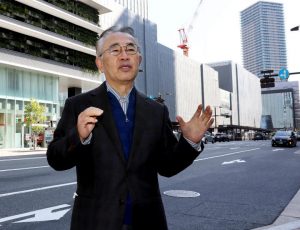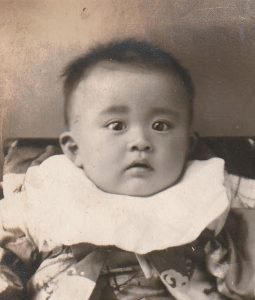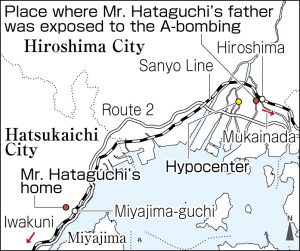Survivors’ Stories: Minoru Hataguchi, 77, Hatsukaichi City—Overcoming undying hatred, he shares his A-bomb account
Mar. 11, 2024
Losing his father in the A-bombing, he is an “A-bomb survivor from birth”
by Hiromi Morita, Staff Writer
Some of the A-bomb survivors in Hiroshima and Nagasaki are what we call “A-bomb survivors from birth.” Minoru Hataguchi, 77, former director of the Hiroshima Peace Memorial Museum, located in the city’s Naka Ward, was exposed to the atomic bombing as an ‘in utero survivor’ in his mother’s womb. Having lost his father in the A-bombing, he had a difficult time after the war and avoided even mentioning the A-bombing. However, half a century later, he began to speak publicly about the unreasonableness brought about by the A-bombing.
On the morning of August 6, 1945, his father, Jiro, then 31, went to work at the Hiroshima Railroad Bureau Management Division (now part of Minami Ward) near Hiroshima Station, from his home on the other side of Miyajima (now part of Hatsukaichi City).
Mr. Hataguchi’s mother, Chieno, who passed away in 2018, was 27 years old and was at home with her daughters, ages five and two. There was a flash, and after a little while, she saw plumes of smoke rising in the air in the direction of Hiroshima. She anxiously waited for Jiro to return to home, but he never came home the next day or the next.
Four days later, Chieno went to Hiroshima Station to look for Jiro. Walking around the burned ruins, she found a pocket watch and belt buckle that Jiro had worn, and took them home with the bones she found nearby.
Chieno was two months pregnant at the time. Mr. Hataguchi said, “I was later told my father died without knowing she was pregnant.” She also said she had been thrust into hell all at once with little children and an embryo. However, it wasn’t until much later that Mr. Hataguchi learned about Chieno’s experience with the A-bombing in detail. She had long avoided talking about the A-bombing.
Having lost the breadwinner of the family, Chieno worked continuously after the war. Mr. Hataguchi felt lonely because his mother did not even come to his elementary school athletic meets. He could not buy what he wanted, and he found himself pondering why he was born without a father and why he became an atomic bomb survivor, even though he was born the year after the A-bomb was dropped, far from the hypocenter. In his mid-teens, he began to hate the A-bomb that killed his father and the country that dropped it, the United States.
Even after graduating from university and getting a job at Hiroshima City Hall, he loathed hearing the words like the A-bomb and peace being spoken in various departments. He lost his father and was left with a huge handicap, so his postwar years were not peaceful. He found the word “peace” a bitter pill to swallow. It made him angry to think that if only there had been no A-bomb and war. He also intended to conceal the fact that he had been exposed to the A-bombing in his mother’s womb.
In 1997, however, due to a personnel change, he became director of the Hiroshima Peace Memorial Museum. It is a key position in conveying the reality of the A-bombing both domestically and internationally. He could no longer conceal the fact that he was an A-bomb survivor. He asked Chieno about her experience in detail for the first time. Although he was an A-bomb survivor himself, he was puzzled by the fact that he had no memory or sense of the A-bombing, but when he showed visitors his father’s belongings and talked about the damage caused by the A-bombing, there was a response.
When he retired as director of the museum, a position he had held for nine years, he was told he was destined to convey the regrets of his father's spirit. He came to believe his mission was to tell people what kind of suffering the A-bombing brought to humanity. He began to serve as a volunteer guide at the museum and communicate his experience with the A-bombing to others.
He says his hatred for the U.S. still never goes away. However, he says, “Hatred cannot be erased by hatred. Rather than retaliate with violence, we should understand the history and the feelings of the other person and have dialogue to alleviate the hatred and stop the chain.” In the face of ongoing conflicts and the looming threat of nuclear weapon use, he speaks to the younger generation.
(Originally published on March 11, 2024)










